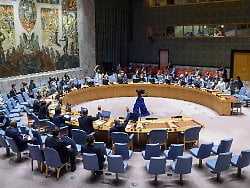“Clear Threat”
US brings Ukraine conflict before UN Security Council
01/28/2022, 08:13 am
The United Nations Security Council will address tensions between Russia and NATO. The US is demanding a public meeting – and could use the big stage to put pressure on Moscow. Meanwhile, Foreign Minister Baerbock is sending a clear message to the Kremlin.
The Ukraine conflict reaches the UN Security Council: The US has called for a public meeting on Monday because of the “clear threat to international peace and security” from Russia, as the US Ambassador to the United Nations, Linda Thomas-Greenfield, communicated. Meanwhile, Federal Foreign Minister Annalena Baerbock questioned the future of the Nord Stream 2 gas pipeline in the event of a Russian attack on Ukraine.
The consultations in New York are to be held in public, probably at 4 p.m. German time. The Security Council is less likely to find solutions to the conflict. Rather, the US could use the international stage as a means of exerting pressure on Moscow. The American UN mission said: “As we continue our relentless pursuit of diplomacy to de-escalate tensions in the face of this serious threat to European and global peace and security, the UN Security Council is a crucial venue for diplomacy.”
In view of a massive Russian troop deployment on the border with Ukraine, the West is concerned that Russia is preparing to invade the neighboring country after annexing Crimea in 2014. The Kremlin categorically denies this. At the same time, he is demanding agreements from the USA and NATO that would ban the eastward expansion of NATO and the establishment of US military bases in countries in the former Soviet sphere of influence.
US welcome statements from Baerbock
Baerbock dismissed Moscow’s demands as groundless. Ukraine’s NATO accession is currently out of the question, she told the newspapers of the Funke media group and the French newspaper “Ouest-France”. “Everyone, including Russia, knows that this is not currently on the agenda.” During her visit to Moscow last week, she “discussed at length with the Russian foreign minister what we are actually arguing about,” she added.
At the same time, she warned Moscow of an escalation: “In the event of a new aggression, we have a wide range of answers, including Nord Stream 2,” said Baerbock in the debate on the Ukraine conflict in the Bundestag. She again emphasized the West’s willingness to engage in dialogue with Moscow. But it is also about “hardness that makes it unmistakably clear: the cornerstones of the European peace order are non-negotiable”.
The US welcomed Baerbock’s announcement. “If Russia invades Ukraine, Nord Stream 2 will not go into operation,” said top US diplomat Victoria Nuland. “I think the statements coming from Berlin – even today – are very, very clear.”
Biden is on the phone with Zelenskyj
Nord Stream 2 was recently at the center of debates about possible sanctions against Russia. There are different positions on the pipeline within the federal government. The Greens in particular are critical of the project, while the coalition partner SPD has so far rejected turning away from the project. Although the line has been completed, permits are still missing.
In a phone call with Ukrainian President Volodymyr Zelenskyy, US President Joe Biden warned, according to a spokeswoman, that there was a “clear possibility” that the Russians could invade Ukraine in February. The White House also said Washington was “looking into additional macroeconomic support to help Ukraine’s economy under pressure from Russia’s military buildup.” Zelenskyy, in turn, said on Twitter that “possibilities of financial support for Ukraine had also been discussed”.
Baerbock also spoke out in favor of economic support for Kiev. “If economic actors have the feeling that the situation in Ukraine as a whole is uncertain or unstable, the willingness to invest will decrease,” she told the Funke media group. That would “play into the hands of Russian President Vladimir Putin,” emphasized the minister. “We want to expand economic cooperation with Ukraine. For example through energy partnerships, for example in the area of ’green hydrogen’.”
